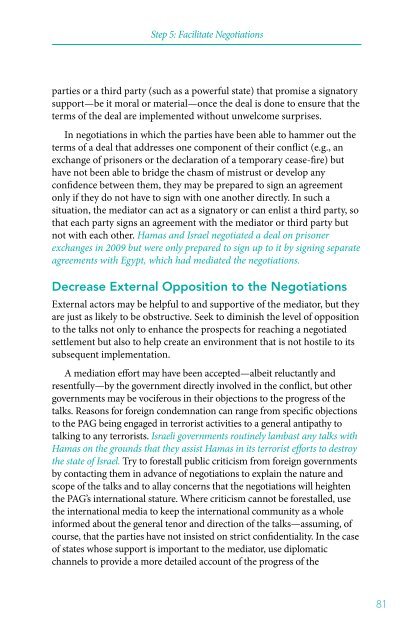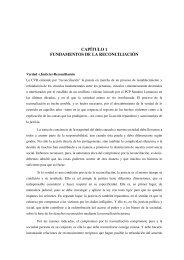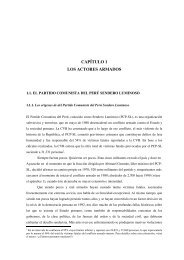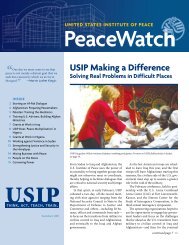Talking to Groups that Use Terror.pdf - United States Institute of Peace
Talking to Groups that Use Terror.pdf - United States Institute of Peace
Talking to Groups that Use Terror.pdf - United States Institute of Peace
Create successful ePaper yourself
Turn your PDF publications into a flip-book with our unique Google optimized e-Paper software.
Step 5: Facilitate Negotiationsparties or a third party (such as a powerful state) <strong>that</strong> promise a signa<strong>to</strong>rysupport—be it moral or material—once the deal is done <strong>to</strong> ensure <strong>that</strong> theterms <strong>of</strong> the deal are implemented without unwelcome surprises.In negotiations in which the parties have been able <strong>to</strong> hammer out theterms <strong>of</strong> a deal <strong>that</strong> addresses one component <strong>of</strong> their conflict (e.g., anexchange <strong>of</strong> prisoners or the declaration <strong>of</strong> a temporary cease-fire) buthave not been able <strong>to</strong> bridge the chasm <strong>of</strong> mistrust or develop anyconfidence between them, they may be prepared <strong>to</strong> sign an agreemen<strong>to</strong>nly if they do not have <strong>to</strong> sign with one another directly. In such asituation, the media<strong>to</strong>r can act as a signa<strong>to</strong>ry or can enlist a third party, so<strong>that</strong> each party signs an agreement with the media<strong>to</strong>r or third party butnot with each other. Hamas and Israel negotiated a deal on prisonerexchanges in 2009 but were only prepared <strong>to</strong> sign up <strong>to</strong> it by signing separateagreements with Egypt, which had mediated the negotiations.Decrease External Opposition <strong>to</strong> the NegotiationsExternal ac<strong>to</strong>rs may be helpful <strong>to</strong> and supportive <strong>of</strong> the media<strong>to</strong>r, but theyare just as likely <strong>to</strong> be obstructive. Seek <strong>to</strong> diminish the level <strong>of</strong> opposition<strong>to</strong> the talks not only <strong>to</strong> enhance the prospects for reaching a negotiatedsettlement but also <strong>to</strong> help create an environment <strong>that</strong> is not hostile <strong>to</strong> itssubsequent implementation.A mediation effort may have been accepted—albeit reluctantly andresentfully—by the government directly involved in the conflict, but othergovernments may be vociferous in their objections <strong>to</strong> the progress <strong>of</strong> thetalks. Reasons for foreign condemnation can range from specific objections<strong>to</strong> the PAG being engaged in terrorist activities <strong>to</strong> a general antipathy <strong>to</strong>talking <strong>to</strong> any terrorists. Israeli governments routinely lambast any talks withHamas on the grounds <strong>that</strong> they assist Hamas in its terrorist efforts <strong>to</strong> destroythe state <strong>of</strong> Israel. Try <strong>to</strong> forestall public criticism from foreign governmentsby contacting them in advance <strong>of</strong> negotiations <strong>to</strong> explain the nature andscope <strong>of</strong> the talks and <strong>to</strong> allay concerns <strong>that</strong> the negotiations will heightenthe PAG’s international stature. Where criticism cannot be forestalled, usethe international media <strong>to</strong> keep the international community as a wholeinformed about the general tenor and direction <strong>of</strong> the talks—assuming, <strong>of</strong>course, <strong>that</strong> the parties have not insisted on strict confidentiality. In the case<strong>of</strong> states whose support is important <strong>to</strong> the media<strong>to</strong>r, use diplomaticchannels <strong>to</strong> provide a more detailed account <strong>of</strong> the progress <strong>of</strong> the81









